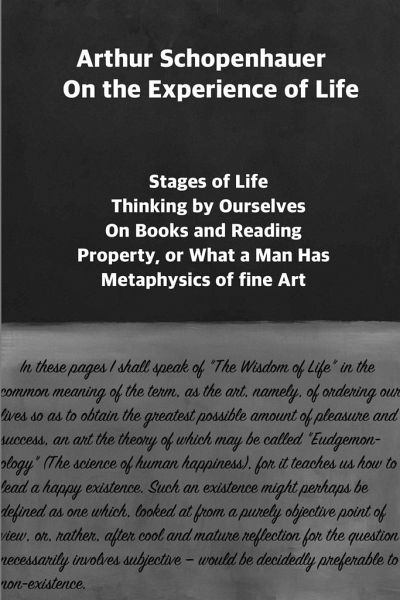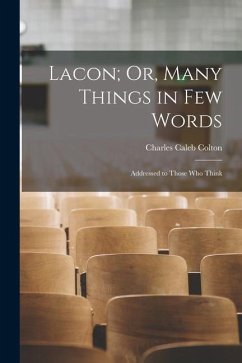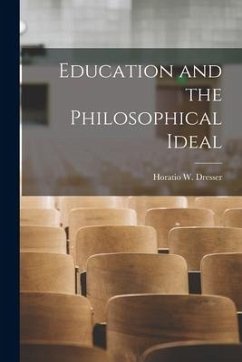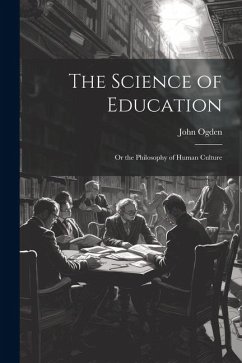
Arthur Schopenhauer
On the Experience of Life : Selection and Editor's Note by Jorge Pinto
Versandkostenfrei!
Versandfertig in 1-2 Wochen
13,99 €
inkl. MwSt.
Weitere Ausgaben:

PAYBACK Punkte
7 °P sammeln!
Arthur Schopenhauer (1788 - 1860) is an influential 19th Century philosopher whose works and ideas were followed by other important philosophers, particularly by Nietzsche, who viewed himself as Schopenhauer's successor. His work also influenced Freud's ideas on psychoanalysis. Thomas Mann, winner of the Nobel Prize for Literature, in his long essay Schopenhauer the Living Thoughts of Schopenhauer, says the philosopher is a "psychologist of the will" and his works to run by way of the psychological radicalism of Nietzsche, straight to Freud and the men who built up his psychology of the uncons...
Arthur Schopenhauer (1788 - 1860) is an influential 19th Century philosopher whose works and ideas were followed by other important philosophers, particularly by Nietzsche, who viewed himself as Schopenhauer's successor. His work also influenced Freud's ideas on psychoanalysis. Thomas Mann, winner of the Nobel Prize for Literature, in his long essay Schopenhauer the Living Thoughts of Schopenhauer, says the philosopher is a "psychologist of the will" and his works to run by way of the psychological radicalism of Nietzsche, straight to Freud and the men who built up his psychology of the unconscious and applied it to the mental sciences. Following Thomas Mann's interpretation of Schopenhauer's ideas, it is not surprising to see Dr. Irvin D. Yalom, a well known psychotherapist and best selling author, choose Schopenhauer as a central character of one of his novels : The Schopenhauer Cure. As in his other two novels based on prominent philosophers, Nietzsche and Spinoza, (When Nietzsche Wept: A Novel Of Obsession and The Spinoza Problem: A Novel) I decided to include "The Stages of Life", of Schopenhauer's Counsels and Maxims in this volume. In this essay he considers that in our childhood we are more given to using our intellect than our will. Following that golden age or magic years of learning about the external world, Schopenhauer warns us that then "… comes the great period of disillusion, a period of very gradual growth; but once it has fairly begun, a man will tell you that he has got over all his false notions "l'âge des illusions est passé". .. Another essay included in this anthology with the evocative title On Thinking for Oneself is written in a didactic style. There, Schopenhauer expresses his strong opinions on the importance of discovering independently what is important for the creative mind. I consider this essay to be relevant in our political environment as well as in our personal and social lives, dominated by social media. In a time of excessive information and opinions that are shared and absorbed without thinking, the ideas contained in Schopenhauer's essay could not be more compelling and current. Following the same ideas, On Books and Reading, another essay included in this book, Schopenhauer can be perceived as an educator and not so much as a philosopher. Here he criticizes those who read for entertainment, as a pastime or for relaxation, consuming books without discerning what is good and what is not or, even worse, reading without assimilating the content. To make the point he uses the following example: you can ruin the stomach and impair the whole body by taking too much nourishment, so you can overfill and choke the mind by feeding it too much. Character is another Schopenhauer essay included in this book. He uses theater to show the contrast between the personality of a narcissistic individual that looks for honor and fame to those actors who only want to perform "great parts: ". In his essay Property, or What a Man Has, Schopenhauer presents the idea of happiness, one of the many topics we often find in his works. Here, the philosopher presents the link between money or wealth and a happy life. Finally, in The Metaphysics of Art, also included in this anthology, Schopenhauer gives an effective path to fight the "Will", which is one of the bases of his philosophy. The "Will", which is in conflict with the intellect, constitutes a series of needs that are an unavoidable part of the human condition and the source of unhappiness, frustration and suffering since what the "Will" commands can never be entirely satisfied.













![Outlines of Philosophical Education [microform], Illustrated by the Method of Teaching the Logic or, First Class of Philosophy, in the University of G Cover Outlines of Philosophical Education [microform], Illustrated by the Method of Teaching the Logic or, First Class of Philosophy, in the University of G](https://bilder.buecher.de/produkte/66/66145/66145423n.jpg)